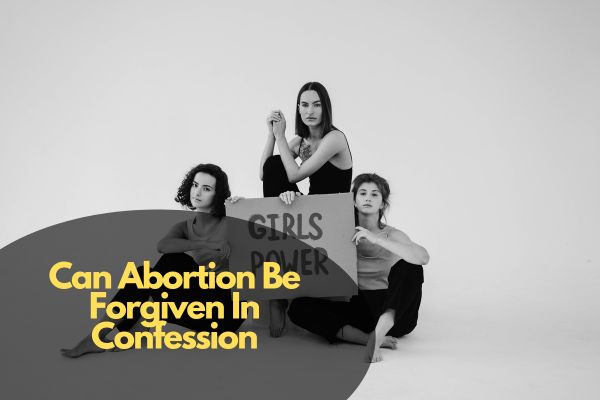Abortion, an emotive and difficult matter, poses ethical concerns and the possibility of asking for forgiveness.
In this article, we will look at whether can abortion be forgiven in confession, various theological viewpoints, and the importance of confession in seeking forgiveness.
We will look at the viewpoints of several religious traditions, including Christianity and Islam, and address the possibility of forgiveness and healing following abortion.
Contents
Can Abortion Be Forgiven In Confession
The forgiveness of abortion in confession varies across religious traditions, with some emphasizing repentance and divine mercy, while others address it through individual spiritual or moral frameworks.
It is a controversial subject that elicits strong emotions and diverse opinions. The question of whether abortion can be forgiven in confession is of particular interest to individuals who have undergone the procedure and seek spiritual solace.
Understanding Abortion
Before exploring the topic of forgiveness, it is essential to grasp the various aspects of abortion. Abortion can occur through different methods, such as medical procedures or the use of medication.
Understanding the different types of abortion is crucial in comprehending the moral complexities surrounding the issue.
Definition of Abortion
Abortion is generally defined as the intentional termination of a pregnancy before the fetus can survive outside the womb. It involves the removal or expulsion of the embryo or fetus, often performed during the first 28 weeks of pregnancy.
Different Types of Abortion
There are several types of abortion procedures, including:
Medical Abortion: This method involves using medication, typically a combination of mifepristone and misoprostol, to induce abortion in the early stages of pregnancy.
Surgical Abortion: Surgical abortion may involve procedures such as suction aspiration, dilation and curettage (D&C), or dilation and evacuation (D&E), depending on the stage of pregnancy.
Religious Perspectives on Abortion
Religious beliefs and teachings play a significant role in shaping attitudes towards abortion. Various religions have distinct perspectives on the matter, often influencing individuals’ moral and ethical considerations. Let’s explore some of the prominent religious perspectives on abortion.
Catholic Church’s View
The Catholic Church considers abortion to be morally wrong and a grave sin. According to Catholic doctrine, life begins at conception, and intentionally terminating a pregnancy is considered the taking of an innocent human life. However, the Catholic Church also emphasizes the importance of forgiveness and offers pathways for reconciliation through the sacrament of confession.
Protestant Views
Protestant denominations hold diverse views on abortion, with interpretations varying among different churches and theologians. Some Protestants oppose abortion, considering it morally wrong, while others believe in the importance of individual choice and the primacy of a woman’s reproductive rights.
Islamic Perspective
In Islam, the view on abortion varies among scholars and schools of thought, but there is a consensus that abortion is discouraged except in specific circumstances, such as when the mother’s life is at risk. Islamic teachings emphasize the sanctity of life and the responsibility to protect it.
Forgiveness in Religious Contexts
Forgiveness is a central theme in many religious traditions, offering believers the opportunity to seek redemption and spiritual healing. Confession, in particular, holds a significant place in Christianity, where individuals confess their sins to a priest or clergy member and receive absolution.
The Concept of Forgiveness
Forgiveness is the act of pardoning someone for their wrongdoing and letting go of resentment and anger. It is an essential aspect of many religious teachings, promoting compassion and reconciliation.
Role of Confession in Christianity
In Christianity, confession is viewed as a means to seek forgiveness and reconcile with God and the community. Through confession, individuals acknowledge their sins, express remorse, and receive absolution from a priest, representing God’s forgiveness.
Views on Forgiveness in Other Religions
While confession plays a central role in Christianity, forgiveness is also emphasized in other religions. For example, in Judaism, forgiveness is sought through sincere repentance, prayer, and making amends with those who have been wronged. In Buddhism, forgiveness is seen as a path to liberation from suffering, and individuals are encouraged to cultivate a compassionate and forgiving mindset.
Can Abortion Be Forgiven?
The question of whether abortion can be forgiven is subjective and depends on one’s religious beliefs and personal convictions. Let’s examine the perspectives of different religious traditions on this matter.
Catholic Church’s Stance
According to Catholic doctrine, abortion is considered a grave sin. However, the Catholic Church also teaches that God’s forgiveness is available to those who sincerely repent and seek reconciliation. Through the sacrament of confession, individuals who have undergone abortion can confess their sin, express remorse, and receive absolution from a priest.
Protestant and Islamic Perspectives
Protestant views on abortion vary, as different denominations hold diverse beliefs. Some Protestant Christians may view abortion as a sin, while others emphasize the importance of individual choice and compassion. In Islam, abortion is generally discouraged except in certain circumstances, and seeking forgiveness is encouraged through sincere repentance and seeking God’s mercy.
Personal Beliefs and Spiritual Healing
Beyond religious teachings, personal beliefs and the path to healing after abortion can vary. Some individuals may find solace and forgiveness through religious practices, while others may seek support from therapists, or support groups, or engage in personal introspection and self-forgiveness.
Seeking Forgiveness and Healing
For individuals seeking forgiveness and healing after abortion, several steps can be taken.
Steps to Seek Forgiveness
Acknowledge the act: Recognize and take responsibility for the decision to undergo an abortion.
Reflect and repent: Engage in sincere reflection and express remorse for the action.
Confession and seeking guidance: Seek guidance from religious leaders or trusted individuals who can provide spiritual counsel and support.
Prayer and personal communication with a higher power: Engage in prayer or personal communication with a higher power, seeking forgiveness and guidance.
Emotional and Spiritual Healing
Therapy and counselling: Consider seeking therapy or counselling to address any emotional or psychological challenges related to the abortion experience.
Support groups: Join support groups or seek community with others who have undergone similar experiences, providing a safe space for sharing and healing.
Self-care and self-compassion: Practice self-care and self-compassion, acknowledging and working through any feelings of guilt, shame, or grief.
Conclusion
Whether abortion may be forgiven in confession is closely linked to religious ideas and personal values. While the Catholic Church provides an opportunity to seek forgiveness via confession, opinions on forgiveness after abortion vary between religious traditions and people.
Finally, the path to healing and forgiveness is very personal and may include a combination of religious rituals, self-reflection, seeking help, and engaging in emotional and spiritual rehabilitation.








